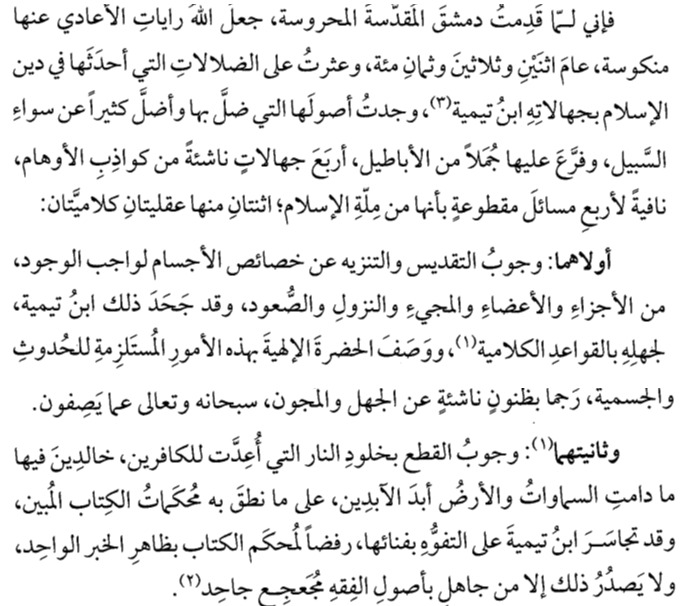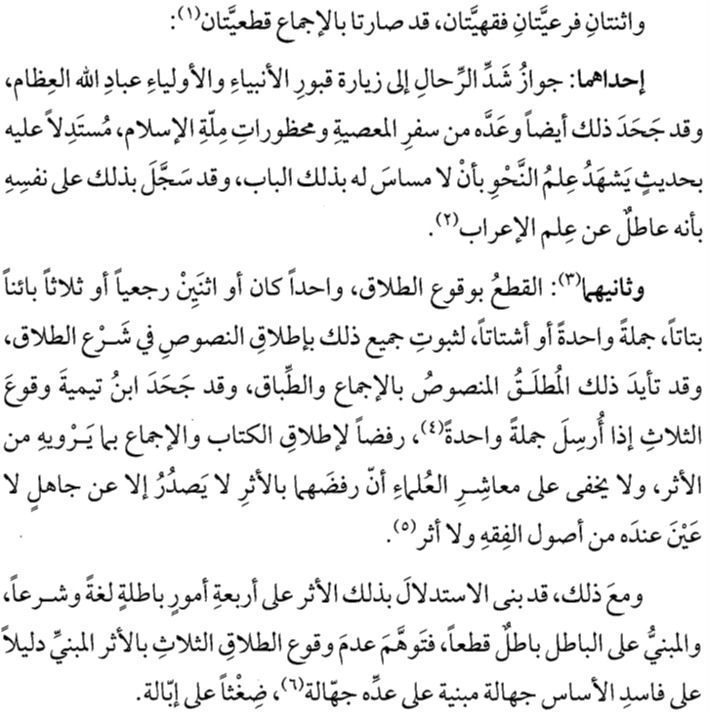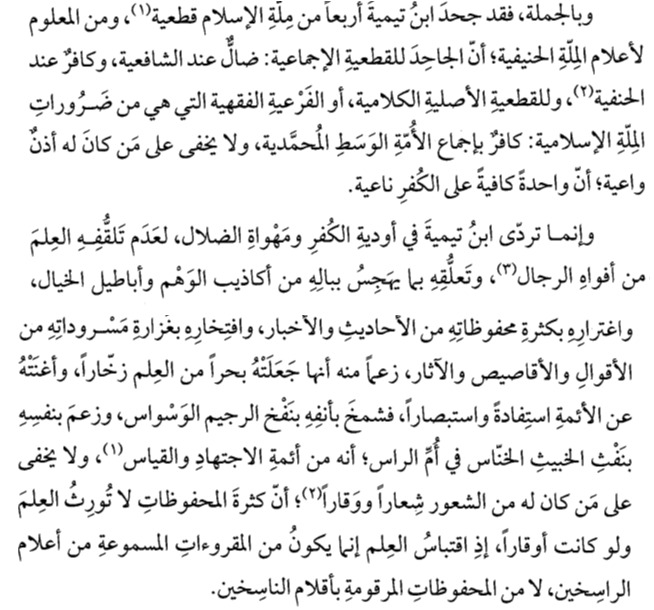Biography of Ibn Taymiyyah (661 – 728 AH) By Taqī al-Dīn al-Subkī (683 – 756 AH)1
Aḥmad ibn ‘Abd al-Ḥalīm ibn ‘Abd al-Salam ibn Taymiyyah al-Ḥanbalī, known as “Taqī al-Dīn”, was born in the year 661 AH and grew up in Damascus. He excelled in (religious) knowledge, possessing great intelligence and memory. Following 690 AH, (certain) matters and words emerged from him about (Islāmic) beliefs (‘aqā’id) on (divine) descent (nuzūl) and ascension (istiwā’) and similar matters that characterise the Ḥashwiyyah (dogmatic anthropomorphists) and Mujassimah (corporealists). Sessions were held for him in the presence of the judges and scholars of Damascus. Pronouncements were made in Damascus against his beliefs, cautioning against it. This occurred repeatedly from him, resulting in (further) sessions being convened.
Most scholars at that time in Shām adopted this (adversarial position). Some of them supported him because he possessed (attributes) that caused many people amongst the laity and some jurists to be attracted to him, given the copious knowledge he possessed by retention and citation, amazing many.
He engaged extensively in it (i.e. knowledge) with his memory and acumen (but) without becoming refined in it through (the guidance of) a learned master (shaykh). He held no official position. A multitude of traders sought him out with their wealth. He spent it on the needy scholars of Ḥadīth and (sacred) knowledge and others, leading to many people being drawn to him. He exceeded in this.
Eventually, enormities in belief and stating them verbally were attributed to him. He developed a (particular) perspective, taking support for it from his excessive intelligence and abundant memory. He thus took to channelling everything he learned towards (peculiar views) he had in his mind. When scholars discussed with him in those sessions, he was incoherent. He would say something that was understood in one way by the laity and most people, which he would deliver to them in sermons and fatwā sessions. When scholars disputed with him over it, he swayed (in a different direction) and presented another meaning for it in another form. Then he returned from those sessions to his companions adopting his prior manner.
His reputation became renowned across the horizons and his name filled the regions. Most people, including multitudes of Ḥadīth-experts and scholars, evidently adore him and hold him in esteem. They chronicle his state and affairs with the love and reverence they hold for him in their hearts. They construe his words in the best possible construal.
The matter grew much worse. (All) the scholars and judges of Shām rebuked him besides those with a motive or (those following their) desires. Reports of him arrived in the lands of Egypt. Their scholars rose up about his affair, alongside the rulers. I heard Shaykh Tāj al-Dīn Abu ‘l-‘Abbās Aḥmad ibn ‘Aṭā – the upholder of the path of Abu ‘l-Ḥasan al-Shādhilī, the teacher of Taṣawwuf to men – say to Shaykh Shams al-Dīn al-Jazarī al-Khaṭīb, someone distinguished in that time in (the fields of) the principles of religion and fiqh: “Ibn Taymiyyah has turned the Damascenes into two groups, each anathematising the other and cursing each other – something intolerable.”
The Nāṣirī administrators at that time were Bībars and Sallār. The scholars convened with them about this. Amongst the Mālikī scholars was Abū ‘Abdillāh al-Qarawī, someone distinguished in knowledge, religion and the madhhab of Mālik, Allāh have mercy on him. Bībars regarded him highly. Shaykh ‘Alā’ al-Dīn al-Qūnawī, who became the chief judge of Damascus, informed me – and he was present with them in that session – that he heard the aforementioned Abū ‘Abdillāh al-Qarawī say to Bībars: “You are not Rukn al-Dīn (pillar of the religion). You are the destruction of religion (hadm al-dīn)! How can you let this one be? Allāh, Exalted is He, has said: ‘O you who believe, fight those adjacent to you from the disbelievers, and let them experience harshness in you.’ (9:123)”
A noble royal kingly Nāṣirī decree was issued at that time, namely the year 705 AH. Ibn Taymiyyah was thus apprehended. He arrived on a Thursday afternoon. He climbed the fort and a session was held for him on Friday morning. They brought a creed in his handwriting. A complaint was raised against him therein, in the gathering of Sallār, the viceroy, in the presence of the chief judge Zayn al-Dīn Ibn Makhlūf al-Mālikī, to establish (evidence) based on the handwriting in the presence of the remaining judges. At that time he was imprisoned in the Jabal Citadel. On account of him, a group of Ḥanbalīs in the lands of Egypt were summoned. Their statements were taken about retracting from what was attributed to them.
Noble royal decrees were written for the removal of all companions of Ibn Taymiyyah, whether a judge, teacher, authoriser etc. On account of this decree, a chief judge, major teacher and multitudes who held him in reverence were removed (from official posts).
The chief judges in that time in the lands of Egypt were Badr al-Dīn Ibn Jamā‘ah al-Shāfi‘ī, Zayn al-Dīn Ibn Makhlūf al-Mālikī, Shams al-Dīn al-Sarūjī al-Ḥanafī and Sharaf al-Dīn al-Ḥarrānī al-Ḥanbalī. He remained imprisoned in the citadel until the year 707 AH. He was then taken out and I met him. He was loquacious.
He was not released until a statement was taken from him and testimony taken against him, entailing his withdrawal from what was attributed to him. After a short while it was mentioned about him that he relapsed. So a session was held for him which I attended at the Madrasa Ṣāliḥiyyah. In attendance was the Shāfi‘ī chief judge, the Ḥanbalī judge Sharaf al-Dīn al-Ḥarrānī, Shaykh Najm al-Dīn Ibn al-Rif‘ah, the imām of the Shāfi‘īs, Shaykh ‘Alā al-Dīn al-Bājī, the master of Uṣūl, and ‘Izz al-Dīn al-Nimrāwī, the scholar of the Shāfi‘īs, as well as the representative of the palace of justice, Ibn Barwānāh.
He requested to branch out the discussion. Al-Nimrāwī prevented him. So he pestered them. Then I heard Ibn al-Rif‘ah say: “I know only that Qāḍī Ḥusayn said, whoever says such-and-such has disbelieved.” Ibn Taymiyyah then stood up, threw off his turban, revealing his head, and began to say: “Kill me (then)!” Then the representative of the palace of justice went towards him and turned him back. Following that, I went to Shām and ‘Abdullāh ibn al-Muḥibb al-Ḥanbalī, the Muḥaddith, showed me Taqī al-Dīn’s letter to his mother in which he said to her: “Allāh has disgraced the army of Iblīs.”
Then, words emerged from him about ‘Īsā and a condemnation of seeking help and tawassul through the Prophet ﷺ. Then he was imprisoned in Alexandria, after having been imprisoned following the session that I attended at the Shar‘ Prison in the Daylam area of Cairo. When he condemned seeking help through the Prophet, he was sent to Alexandria and was imprisoned there.2
Eventually, the sultan arrived from Karak. He was then released because one of the Arabs interceded for him in the year 710 AH. He remained in Cairo until the year 712 AH. ‘Izz al-Dīn al-Nimrāwī informed me that Ibn Taymiyyah gave a fatwā to Sallār to execute the Marāziqah residents of Ḥawf – ascetics ascribed to ‘Uthmān ibn Marzūq who say inshāAllāh in all or most affairs.
When it was the year 718 AH, reports came that he rejected the occurrence of ṭalāq when one takes an oath by it and breaks it.3 The sultan gathered the chief judges of the lands of Egypt, namely Badr al-Dīn Ibn Jamā‘ah, Shams al-Dīn al-Ḥarīrī, Zayn al-Dīn al-Mālikī and Taqī al-Dīn al-Maqdisī al-Ḥanbalī. They agreed to ban him from fatwā. The sultan wrote this to Tankiz (viceroy of Damascus), so they banned him in Shām. The chief judges there at that time were Najm al-Dīn ibn Ṣarṣarā al-Shāfi‘ī, Ṣadr al-Dīn ‘Alī al-Ḥanafī, Jamāl al-Dīn al-Zawāwī al-Mālikī and Shams al-Dīn ibn Muslim al-Ḥanbalī.
I refuted him during that year (i.e. 718 AH) for what he said about ṭalāq in a fatwā that issued from him, in a volume I titled al-Taḥqīq fī Mas’alat al-Ta‘līq.
Then it reached us from him that he rejects the occurrence of three ṭalāqs in a single pronouncement. Then he sealed that with an unspeakable disaster and an inexcusable wrong by censuring the journey to visit the Prophet ﷺ. The sultan gathered the chief judges of the lands of Egypt, namely Badr al-Dīn ibn Jamā‘ah al-Shāfi‘ī, Shams al-Dīn al-Ḥarīrī al-Ḥanafī, Taqī al-Dīn al-Ikhnā’ī al-Mālikī and Taqī al-Dīn al-Maqdisī al-Ḥanbalī. They agreed he was to be imprisoned. This was in the year 727 AH. They wrote their statements.
After their dispersal from the presence of the sultan, I saw the apprentice of Kātib al-Sirr Ibn al-Athīr arrive at the Ṣāliḥiyyah to take their statements. The noble decree on this (matter) arrived at Damascus to Tankiz, Allāh have mercy on him. He thus sent Ibn al-Khaṭīr, who at that time was a small doorman, to him (i.e. Ibn Taymiyyah). He deported him to the Damascus citadel where he was imprisoned until he died in the year 728 AH. When I arrived at Damascus I saw copies of the statements of the four chief judges of Egypt about his imprisonment. The text of what Badr al-Dīn wrote is…4
The chief judge Shams al-Dīn Ibn al-Ḥarīrī would often say: “Were it not for a scandal (erupting), I would have ruled on his disbelief because of his opposition to consensus on the issue of ṭalāq.” Ibn al-Ḥarīrī died before him.
When I came to Damascus, I found something else of his that I had not heard about (previously), namely that he opines that the disbelievers will come out of the Hellfire and no one will remain therein. He compiled a book on that. The person who accompanied him most and revered him most refuted him during his lifetime: our friend, Ḥāfiẓ Shams al-Dīn al-Dhahabī, because of that. He sent him (a letter) rebuking him for it. He was not successful in this. His followers became enemies of him because of it, given they are rabble.
Then, when he died, we thought, he had moved on to Allāh, Exalted is He, and He knows best about him, in hopes of not mentioning him (anymore). “That is a nation that has passed.” (Qur’ān, 2:134) (However), a community emerged from his followers having no share (in knowledge), ignoramuses, misled by him through imitation (of him), misleading people with what he used to say, without knowledge. They gained authority over people through it, harming them.
If one knew nothing about his condition but that the judges of Sharī‘ah ruled he be imprisoned and that they imprisoned him until he died, someone unaware of his condition should follow the decree of the judges of Sharī‘ah and what they upheld about him. They banned him from fatwā in his lifetime, so how can his opinion be implemented after his death?
He has laity amongst his followers who revere him out of imitation, and they exalt him. When another layperson opposes them, who Allāh has saved from the same state as them based on what he believes about him via the pure jurists, they gain authority over him and take him to someone that will enact vengeance on him given their belief that he criticised a scholar, even though what he said is only part of what the judges of Sharī‘ah have said about him and (what) they judged about him on account of it. If a person is knowledgeable, then he can look inside his books and what he has filled them with – we ask Allāh for well-being.
Criticising him for what is (true) of him is showing goodwill to the religion, for which a man is rewarded. It is necessary to caution against him and his followers. May Allāh spare the Muslims of their evil. I hope, inshāAllāh, that nothing drives me to write these words besides goodwill because I fear (others) being deceived by his followers and the time of (people) being acquainted with his (reality) becoming distant, so I said some of what I know in a just and fair manner, without excess nor falling short. Someone who objects to a journey to visit the Chosen One, how will his condition be?!
One of the strangest things is I came across a refutation of his against the decree to imprison him, in which he spoke about a word in his fatwā. This man is strange. He speaks to the laypeople who he gives fatwā to and preaches to with speech from which they and most other people understand only one meaning. Then, when argued against, he begins to reinterpret it. He will often insert something into his statement so he has a way to reinterpret it. This is not clarity and guidance, but rather it is obfuscation and misguidance.
The laypeople only understand the plain meaning of the words of a muftī or preacher. A muftī, preacher and teacher are set up to clarify. Allāh, Exalted is He, said to His Prophet ﷺ: “So that you clarify to the people what was revealed to them.” (16:44) Hence, what is demanded by the Sharī‘ah is clarity. The scholars are the heirs to the prophets from whom this was demanded. This man acts contrary to this when he withdraws from the plain meaning of his words and goes towards reinterpretation. If this was what he meant from the start then why did he leave it open and drive people to understand its plain meaning? If it was not what he meant at the start, and he only turned towards it during disputation, this is not the manner of scholars.
Safety from this man is to leave him completely and leave his speech as far as possible. If it is known about anyone that he gives fatwā on something in which (Ibn Taymiyyah) was isolated, he will be disciplined and prevented so people are secure from him. May Allāh by His grace and favour protect His religion and aid its helper.
This was written on the morning of Wednesday the 22nd of Ṣafar in the year 755, outskirts of Damascus.
The Author: Shaykh al-Islām Taqī al-Dīn al-Subkī
Shaykh al-Islām Taqī al-Dīn Abu ‘l-Ḥasan ‘Alī ibn ‘Abd al-Kāfī al-Subkī (683 – 756 AH) was one of the great luminaries of Islāmic scholarship. Born in the north of Egypt, he completed his early education under his father Qāḍī Zayn al-Dīn ‘Abd al-Kāfī (659 – 735 AH), who took great care that his son was preoccupied with learning.
He studied under prominent experts in the different sciences, like Abū Hayyān al-Andalusī in Arabic, al-Dimyāṭī in Ḥadīth, Taqī al-Dīn al-Sā’igh in Qirā’āt and Ibn al-Rif‘ah in Shāfi‘ī Fiqh. He taught Ḥadīth in Cairo and Syria, becoming head-professor at the prestigious Dār al-Ḥadīth al-Ashrafiyyah, the same madrasah in which Imām al-Nawawī had taught. He also delivered the Friday sermons at the Grand Umawī Masjid in Damascus. A prolific author, his famous works include al-Sayf al-Maslūl and Shifā’ al-Siqām. He was the Shāfi‘ī judge in Damascus for a long period. He was pious and would exert himself in worship.
His students include al-Isnawī, al-Bulqīnī, Fayrūzābādī, Zayn al-Dīn al-‘Irāqī and ‘Abd al-Qādir al-Qurashī.
Tāj al-Dīn al-Subkī, his illustrious son, said about him: “He was a marvel in recollecting tafsīrs, the texts of ḥadīths and their sources, and knowing the hidden defects, the names of narrators, their biographies and death dates, and knowing the short and long chains and the strong and weak (ḥadīths). He had a remarkable recollection of battles, biographies, genealogies, and the discreditation and accreditation (of narrators). He was a marvel in remembering the viewpoints of the ṣaḥābah and tābi‘īn and groups of scholars.”5
His contemporary, al-Dhahabi (673 – 748 AH), said about him: “He was truthful, careful, virtuous, religious, humble, with beautiful features, from the vessels of knowledge. He knows fiqh and explains it; the science of Ḥadīth and refines it; Uṣūl and teaches it; and Arabic and verifies it. He later recited (the Qur’ān) with the different transmissions to Taqī al-Dīn al-Ṣā’igh. He authored proficient works. He remains in his age the one that is looked towards for verification and virtuosity. I heard [Ḥadīth] from him and he from me. He was the judge in Shām and his judgements were praised. May Allāh support him and keep him upright.”6
Even Ibn Taymiyyah held al-Subkī in high regard, despite the latter’s opposition to him.7
Ibn Kathīr said about him: “He has many widely distributed books containing much benefit. During his judgeship, he continued to author and write until his death. He would recite (the Qur’ān) frequently. I was told that he would perform Tahajjud by night. May Allāh have mercy on him.”8
Ibn Ḥajar al-‘Asqalānī said about him: “There was no unusual or difficult issue that came to him but he produced a write-up on it, in which he gathered its disparate parts, whether long or short. This is evident from his writings. His son compiled his fatwās in four volumes.”9
He passed away aged 73 in Cairo.
Footnotes


